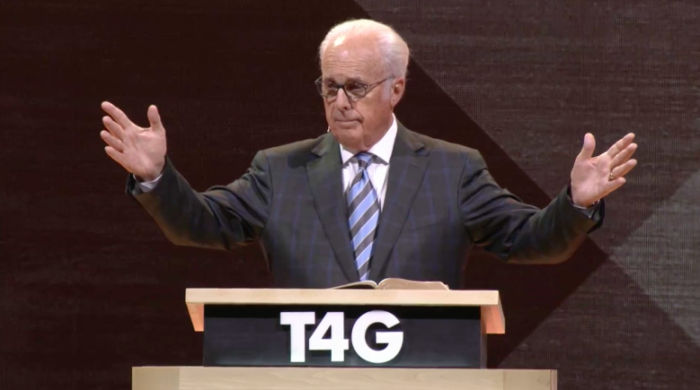‘Justice’ is Merriam-Webster’s ‘Word of the Year’ for 2018; did evangelicals give it a boost?

Justice is blind. Justice is served. Justice is, according to Martin Luther King Jr., where the arc of the moral universe bends toward. It is also Merriam-Webster’s word of the year for 2018.
Merriam-Webster released an announcement on Monday stating that “Justice” was the most looked-up word in 2018 on their website, having seen a 74 percent increase compared to 2017.
“The concept of justice was at the center of many of our national debates in the past year: racial justice, social justice, criminal justice, economic justice,” stated the dictionary company.
“In any conversation about these topics, the question of just what exactly we mean when we use the term justice is relevant, and part of the discussion.”
Merriam-Webster concluded that news events like attorney Robert Mueller’s investigation and the heated debate over the confirmation of Supreme Court Justice Brett Kavanaugh were contributing factors.
“Justice has varied meanings that do a lot of work in the language—meanings that range from the technical and legal to the lofty and philosophical. For many reasons and for many meanings, one thing’s for sure: justice has been on the minds of many people in 2018,” continued Merriam-Webster.
Other heavily searched entries on the dictionary website included “Nationalism,” “Pansexual,” “Lodestar,” “Epiphany,” “Feckless,” “Laurel,” “Pissant,” “Respect,” “Maverick,” and “Excelsior.”
“Stan Lee’s motto and salutation excelsior spiked following his death in November. He used the word to conclude each of the monthly columns he wrote for Marvel Comics,” noted the dictionary site.
Justice has been a word found in the center of major debates and discussion points among evangelical Christians during 2018, and the social justice debate was #9 on The Christian Post's top 10 stories of 2018.
In August, influential California Pastor John MacArthur criticized what he called evangelicals' "newfound obsession with the notion of 'social justice'" in a series of blog posts. That was followed by a statement signed by other evangelical leaders.
“Specifically, we are deeply concerned that values borrowed from secular culture are currently undermining Scripture in the areas of race and ethnicity, manhood and womanhood, and human sexuality. The Bible's teaching on each of these subjects is being challenged under the broad and somewhat nebulous rubric of concern for 'social justice,’” read the statement in part.
Others evangelicals criticized the statement. Russell Moore, president of the Southern Baptist Convention's Ethics & Religious Liberty Commission, responded that he believed people “who would say [they oppose social justice] don't really believe it [because they] don't act that way when it comes to the issues they care about and in most cases rightly care about.”
“In almost every case, we are not really talking about 'social justice' and we are not even talking about social engagement broadly. We are almost always talking about race,” said Moore.
“I don't even want to concede to the conceit that what we are talking about is a broader issue of social engagement because again, that is almost never the case. Some of the very people who would say this are the people who have talked about, and rightly so, abortion and the systemic public problem of abortion.”
In September, the National Association of Evangelicals decided to update their “For the Health of the Nation” public policy guide to include a new category titled “Racial Justice and Reconciliation.”
"The United States has a tragic history of genocide against Native Americans, the cruel practice of enslaving Africans, and the unjust segregation and exploitation of immigrants and the descendants of slaves," noted the updated guide.
"While the United States has made significant strides toward legal and social equality in principle, the legacy of racism and implicit racial bias still leaves many Native Americans, African-Americans, Asian-Americans, Hispanics and other ethnic minorities vulnerable to a variety of social ills."
Many evangelical pastors preached or wrote on the issue of justice in 2018, including Matt Chandler, Tim Keller, Trip Lee and Bartholomew Orr.
Preaching in April at the Southern Baptist Convention's Ethics & Religious Liberty Commission MLK50 conference in Memphis, Chandler expressed concern about some of the inconsistencies among his God-fearing flock when it comes to racial issues.
"If I preach the sermon out of the book of Isaiah on justice, my inbox would fill with their glee that I would broach the subject. But if I applied it to the subject of race, then all of a sudden I was a Marxist or I've been watching too much of the liberal media. If I spoke on abortion, I was applauded as courageous, as a ferocious man of God, and yet when I would tackle race I was being too political," Chandler said.
At the Together for the Gospel conference in Louisville, Kentucky, Virginia pastor David Platt remarked, "Churches can be the most powerful impetus for justice in our culture on the issue of race if we will humble ourselves before God and one another, if we will repent and pray and work together for justice in a way that brings great glory to our God."




























